2001 Toyota 4Runner Tires, Repair & Service
Get Started
Complete Auto Care for Your 2001 Toyota 4Runner
-
TIRES FOR YOUR 2001 Toyota 4Runner View Tire Info GET TIRE PRICING
-
REPAIR FOR YOUR 2001 Toyota 4Runner View Repair Info SCHEDULE REPAIR
-
MAINTENANCE FOR YOUR 2001 Toyota 4Runner View Maintenance Info SCHEDULE MAINTENANCE
-
OFFERS FOR YOUR 2001 Toyota 4Runner Limited Time Tire Offers VIEW ALL COUPONS
2001 Toyota 4Runner Tires
Recommended Tires | Tire Information
2001 Toyota 4Runner Tires Sizes, Speed Ratings, and Inflation
Not sure about your 2001 Toyota 4Runner tire size? Use the following chart to find information on tire size, speed rating, and inflation.
| Trim Level | Speed Rating | Inflation in PSI F/R | Tire Size |
|---|---|---|---|
| 2001 Toyota 4Runner Limited | S | 32 PSI/32 PSI | P265/70R16 |
| 2001 Toyota 4Runner SR5* | S | 29 PSI/29 PSI | P225/75R15 |
| 2001 Toyota 4Runner SR5* | S | 32 PSI/32 PSI | P265/70R16 |
|
2001 Toyota 4Runner Limited Speed Rating: S Inflation F/R: 32 PSI/32 PSI |
|
2001 Toyota 4Runner SR5* Speed Rating: S Inflation F/R: 29 PSI/29 PSI |
|
2001 Toyota 4Runner SR5* Speed Rating: S Inflation F/R: 32 PSI/32 PSI |
* Note: these models have different tire sizes depending on vehicle options.
Recommended Tires for Your 2001 Toyota 4Runner
What tires are best for a 2001 Toyota 4Runner? Check out the following tire brands and types.
 ALENZA AS ULTRA
ALENZA AS ULTRA
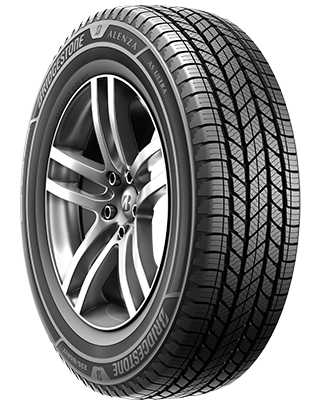
- No warranty
- All-Season
- Light Truck Tires
 Blizzak DM-V2
Blizzak DM-V2
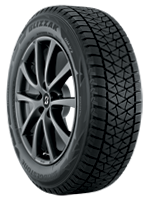
- No warranty
- Winter
- Winter
 Dueler A/T Revo 3
Dueler A/T Revo 3
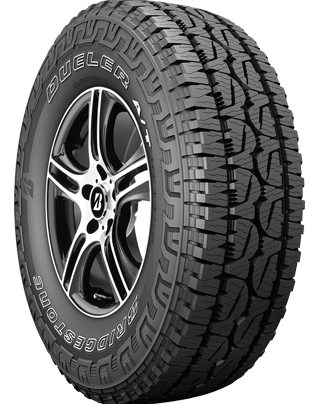
- Platinum Pact Limited Warranty
- All-Season
- Light Truck Tires
 Destination LE3
Destination LE3
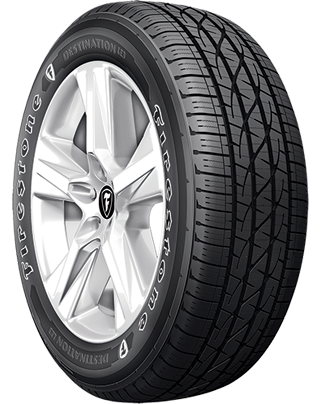
- No warranty
- All-Season
- Light Truck Tires
 Destination A/T2
Destination A/T2
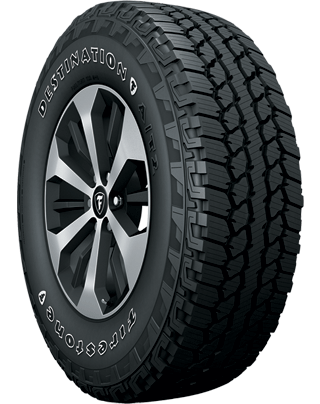
- Gold Pledge Limited Warranty
- All-Season
- Light Truck Tires
 Winterforce 2 UV
Winterforce 2 UV
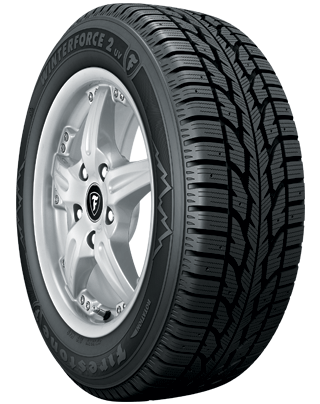
- No warranty
- Winter
- Winter

- No warranty
- All-Season
- Passenger Tires
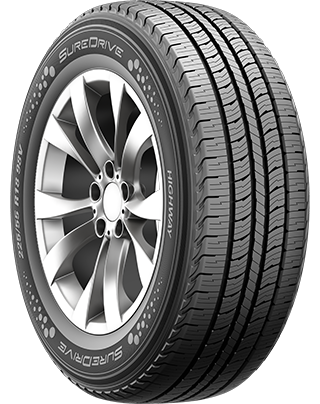
- No warranty
- All-Season
- Light Truck Tires
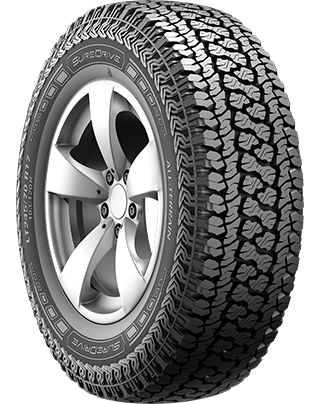
- No warranty
- All-Season
- Light Truck Tires
 Extensa A/S II
Extensa A/S II

- No warranty
- All-Season
- Passenger Tires
 OPEN COUNTRY A/T III
OPEN COUNTRY A/T III
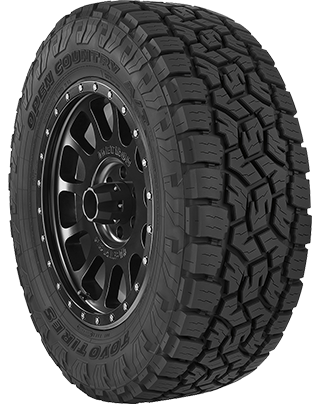
- No warranty
- All-Season
- Light Truck Tires
About 2001 Toyota 4Runner Tires
Apart from finding the right tire size, there are a couple of other factors to consider when buying Toyota 4Runner tires like how and where you drive, and how much you want to spend. Think about where you live (countryside vs. city vs. mountains) and the kind of unexpected weather you're likely to experience when evaluating your driving conditions. Drivers in states that fully experience all four seasons often buy two sets of tires: one for winter and one for summer. Other drivers buy one set of all-season tires instead. That way they don't have to return to the tire shop and their vehicle is always ready for sun, rain, and light snow!
Driving style is next on the list to think about when buying tires. If you're a diehard off-roader, you have very different tire needs than a highway commuter who doesn't leave the paved path. Talk to a tire technician at Firestone Complete Auto Care for help choosing the best tire for you, or start shopping for Toyota 4Runner tires online.
Installing Toyota 4Runner Tires
We sell tires, but we also service them and care for all the around-the-wheel components. We're your tire shop and a complete service center for tire installation, maintenance, repair, rotation, and alignment! Buy 2001 Toyota 4Runner tires online and schedule your installation when it's convenient for you.
2001 Toyota 4Runner Tire Questions
-
Is Toyota tire inflation important? Even a tiny decrease in tire pressure could impact your safety and fuel economy. Maintaining proper tire pressure can help increase fuel economy, improve braking time, and boost tire lifespan.
-
What do the tire sidewall numbers mean for my Toyota 4Runner? Your tire sidewall gives you information about load carrying capacity, speed rating, treadwear, traction, and tire size. Talk to one of our tire technicians to learn how to read the numbers on your tire!
-
How do I check the tread depth on my Toyota tires? Stay on top of your tire tread depth to help avoid a dangerous drive. You can check tread depth with a penny. Hold the penny so that Abraham Lincoln is facing you, then place your penny into a tread groove upside down. If you can see the top of Abe’s head, your tread is shallow and it might be time for new Toyota 4Runner tires. Grab a penny. Hold the so that Abe Lincon's head is facing you and his hair is pointing toward the ground. Then, place the penny into a tread groove. If you can see the top of Abe’s head, your tread is shallow and it might be time for new Toyota 4Runner tires.
Types of 2001 Toyota 4Runner Repairs
Want more details? Choose a service below to read more about Toyota 4Runner repairs at Firestone Complete Auto Care.
2001 Toyota 4Runner Repair Information
For most drivers, the words “car repair” don’t exactly spark excitement. We’re here to change that, though. At Firestone Complete Auto Care, we want to make car repair painless and hassle-free. Bring your 2001 Toyota 4Runner in for repair services and our skilled repair technicians will get your 4Runner back on the road. We'll work to evaluate the scope of repairs needed and explain your options. We’ll never recommend a repair we don’t think is necessary for your safety or the performance of your Toyota.
How Much Does Toyota 4Runner Repair Cost?
The cost to repair your 2001 Toyota 4Runner depends on what kind of repair you need, the cost of any replacement parts, the labor involved, and where you live. But no matter your location, you may be able to save money with one of our many auto repair coupons or offers.
A few different aspects can influence repair costs for your 2001 Toyota 4Runner, like
2001 Toyota 4Runner Auto Repair Q&A
-
Do I need to follow Toyota's maintenance schedule? The cheapest 2001 Toyota 4Runner repair is the one that isn’t necessary in the first place! Staying up-to-date with your car’s scheduled maintenance services is a great way to keep future repair costs low.
-
What's wrong if something feels 'off' in my Toyota? No, we’re not talking about finding the best jams on the radio! You know your car best, and you’re the first person who will notice if something doesn’t feel right (like new smells, sights, or sounds coming from your car). If you sense that something is 'off,' stop in for a Courtesy Check to have these symptoms checked out ASAP. Early action could help you prevent Toyota 4Runner repairs.
-
Why do you recommend certain repairs for my Toyota? Talk to your technician. We'll never recommend a service or repair for your 2001 Toyota 4Runner that we don't think is necessary for your safety.
Get Your 2001 Toyota 4Runner Brakes Fixed
You might have a strong and reliable engine in your Toyota 4Runner. But if you can’t stop it, it’s as good as scrap metal. If you’re experiencing squeaky brakes or a loss of braking power, don’t wait! Unresponsive brakes make it tough to give the road your best. What's more, waiting for things to figure themselves out can result in more damage to your brakes and your wallet. Get your 2001 Toyota 4Runner brakes fixed at Firestone Complete Auto Care. Our brake repair services include brake pad/shoe removal and replacement, brake rotor/drum machining, brake fluid exchange, and wheel cylinder and brake caliper installation.
Toyota 4Runner Brakes Questions
-
Why is my 4Runner shaking as I brake? If your 4Runner shakes when you brake, you could be dealing with warped rotors, faulty brake calipers, worn brake pads or rotors, or loose or worn suspension parts. Schedule a free brake inspection at Firestone Complete Auto Care for help diagnosing your brake issue.
-
How often do I need to replace my 4Runner brake pads? In general, brake pads can last from 30,000 to 40,000 miles. Certain factors, like driving on highways mostly and braking smoothly, can help your brake pads last longer. Hauling heavy loads and riding your brakes can shorten brake pad lifespan.
-
Does brake fluid leak when the car is off? Your 4Runner has a closed hydraulic brake system, meaning you should not have a brake fluid leak under normal conditions. However, parts of your brake system can wear out over time or become damaged, which can lead to a brake fluid leak.
2001 Toyota 4Runner Drivetrain Repairs
Drivetrains for front, rear, and all-wheel-drive and 4WD vehicles are not all the same. You don't want to go to any random shop for drivetrain repair. You want to come see the technicians at Firestone Complete Auto Care. We can take care of most 2001 Toyota 4Runner drivetrain components Your Toyota could be crying out for driveshaft repair if you notice resistance when turning, heavy vibrations in your floorboards, clunks when shifting, or vibration as your vehicle accelerates.
2001 Toyota 4Runner Drivetrain Questions
-
What are the symptoms of a damaged Toyota drivetrain system? Noises toward the back of your Toyota 4Runner, leaking fluid, trouble turning — these could all be signs of drivetrain damage you want to address. Take action before something more severe happens.
-
What causes a 4Runner’s malfunction indicator light (MIL) to illuminate? If your 4Runner has its malfunction warning light (more commonly called the check engine light) illuminated, it could indicate engine troubles, problems with the transmission, electrical issues, malfunctioning sensors, connector problems, or misfire issues.
-
How worried should I be about a drivetrain malfunction in my 4Runner? If your 4Runner has a drivetrain malfunction, don't wait. Get it checked out by a professional mechanic. Identifying the underlying cause and performing the appropriate repairs right away can help prevent further damage and avoid unsafe driving conditions.
Wheel Alignment for 2001 Toyota 4Runner
With an alignment service, adjustments are made to your Toyota 4Runner’s suspension system, which connects the wheels with the rest of the vehicle. In an alignment service, the individual angles of your tires are adjusted so that they come into contact with the road in just the right way — the way Toyota intended them to. When you bring in your 2001 Toyota 4Runner, we’ll perform an alignment check first. After that, we can adjust your wheel alignment angles until they match Toyota’s recommended measurements.
Toyota 4Runner Alignment Questions
-
What can knock my Toyota 4Runner out of alignment? Hitting a pothole or curb can alter your wheel alignment. So can general wear and tear over time.
-
How frequently should you get a wheel alignment for your 4Runner? It’s usually suggested you check your alignment about every 6,000 miles or 6 months (whichever occurs first). Still, you should reference your 4Runner owner’s manual for Toyota's recommended interval.
-
Does getting new 4Runner tires mean you need an alignment? It’s not mandatory to get an alignment after installing new tires on your 4Runner, but it can be a smart decision! Proper alignment from the jump can help improve handling, fuel efficiency, and tire wear.
2001 Toyota 4Runner Engine Repair
When your Toyota 4Runner engine needs repairs, our technicians will provide you with a thorough explanation beforehand. We don't start working until we have your approval. If a service can wait, we’ll make sure you know. We'll also tell you if it's necessary for your safety. We want to provide you with the information you need to make an informed engine repair decision. Choose Firestone Complete Auto Care for Toyota 4Runner engine repairs and you can feel confident knowing that we use Toyota-approved parts and components like the serpentine belt, motor oil seal, ignition coil, or other parts.
Questions About 2001 Toyota 4Runner Engines
-
Why does the check engine light come on when I start my 4Runner? It's okay if your check engine light comes on when you first start your vehicle. This is a sign that your vehicle is testing its circuits. The light should go off shortly. Bring your vehicle in if it doesn't.
-
Why does my Toyota engine sound different? Unusual noises can signal a problem with your Toyota 4Runner engine. Tapping or knocking could mean you're low on oil. Whistling could mean a belt is misaligned or there's an intake leak. Squealing can indicate a loose fan belt, and grinding might be coming from the brakes, not the engine.
-
Are you unknowingly damaging your Toyota 4Runner engine? Certain driving habits can damage your engine and should be avoided. These habits include 'running on fumes,' revving the engine while still in Park, or pushing 'the pedal to the metal' before the engine has warmed up. Help sustain your engine’s performance and efficiency by staying miles away from these bad driving practices.
Tire Repair for Your 2001 Toyota 4Runner
Firestone Complete Auto Care is here for you when your 2001 Toyota 4Runner needs flat tire repair or inspection. Our tire technicians can determine whether it's safe to plug and patch the tire, or whether it needs to be replaced. We’ll begin by taking a look at where the damage is, the type and extent of the tire damage, and how all of your tires are wearing.
If we determine that your 2001 Toyota 4Runner tire can be safely repaired, the repair process is actually fairly simple: (1) Separate the tire from the vehicle wheel, (2) use a filler to close up the puncture (this is to keep moisture from getting in), and (3) secure and seal the inner tire liner to ensure the tire is airtight.
Toyota 4Runner Tire Repair Questions
-
What happens if I drive my Toyota on a flat tire? A flat tire that’s not addressed can take a terrible toll on the rest of your car. Until you have it repaired or replaced, drive your 4Runner as little as possible to reduce your risk of damage to the wheels and alignment – or further damage to that already struggling tire!
-
Will a temporary sealant fix my Toyota's flat tire? Temporary sealants will solve your problem… for a little bit. If you’ve seen temporary or emergency tire sealant before (it usually comes in a can), it can be tempting to turn to this as a solution for your flat tire. Keep in mind that these fixes could buy you some time to get to Firestone Complete Auto Care for a proper repair, but they could also cause some harm in the process (for example, damage to your TPMS). Plus, using a product like this could void your tire warranty.
-
What is causing the tires on my 4Runner to keep losing air? If your 4Runner tires are always losing air, you may have a puncture, damaged wheel, or leaking valve stem.
Maintenance for Your 2001 Toyota 4Runner
When it comes to your Toyota 4Runner, how you treat your car makes all the difference in its performance. With proactive maintenance, your 4Runner could be on the road well past the 200,000 mile mark.
Guide to 2001 Toyota 4Runner Scheduled Maintenance
Instead of waiting for an issue to arise with your 4Runner, you can stay ahead of problems before they even begin. Rely on the recommended maintenance schedule that’s been created just for your 2001 Toyota 4Runner! The recommended maintenance schedule is put together by Toyota, your vehicle manufacturer. Scheduled maintenance services can vary depending on driving conditions, climate, and other factors; however, there’s a good chance that your vehicle’s recommended maintenance services will include tire rotations, vital fluid checks/exchanges, filter changes, brake pad replacement, and oil changes. Keeping up with routine service appointments is a great way to keep your 4Runner running for longer, decrease your risk of dangerous malfunctions on the road, and maybe even save you the headache of dealing with common 2001 Toyota 4Runner problems in the future.
Essential Maintenance to Keep Your 2001 Toyota 4Runner Running Newer, Longer
Bring your 2001 Toyota 4Runner to Firestone Complete Auto Care for factory-recommended maintenance services and our technicians will jump right in with a Courtesy Check. The Courtesy Check helps us see what we’re working with under the hood, and allows us to alert you to any potential problems before they worsen. During a Courtesy Check, we’ll always check your battery, then we’ll move on to inspect your 4Runner’s head and tail lights, tires, fluid levels, alignment, and windshield wipers.
Firestone Complete Auto Care is the place to go for 2001 Toyota 4Runner maintenance. So visit us regularly, or visit us urgently. Many locations are open on weekends and in the evening.
2001 Toyota 4Runner Maintenance Q&A
-
What should I do after hitting a pothole in my Toyota 4Runner? Check your car for pothole damage! If you’ve recently hit a pothole (or even if you don’t remember hitting one… they can be sneaky!) check your tire treads, tire sidewalls, and wheels for damage. Potholes can also knock your car out of alignment, so have your alignment checked if you suspect you’ve driven over a rough patch of road lately.
-
When should I use high mileage oil in my Toyota 4Runner? If your Toyota 4Runner has ticked past 75,000 miles, consider switching to high mileage oil at your next oil change to give your engine what it needs to go another 75,000 (or more!). High mileage oil: make it a high priority!
-
Can I ignore dashboard lights on my Toyota? Because there might be a problem under the hood. Those warning lights are there for a reason! As soon as you notice that one’s illuminated, take your Toyota 4Runner to Firestone Complete Auto Care so you can address any small problems long before they worsen.
2001 Toyota 4Runner Battery Replacement & Size
Not sure what battery to get for your Toyota 4Runner?
| Battery | Engine | Warranty | Cold Cranking Amps | |
|---|---|---|---|---|
| 24F-3 | V6/3.4L | Replacement 24 months | Performance months | 650 |
| 24F-6 | V6/3.4L | Replacement 36 months | Performance months | 750 |
| 24F-RP | V6/3.4L | Replacement 48 months | Performance months | 750 |
2001 Toyota 4Runner Batteries
Generally, car batteries last from three to five years. Don’t get stranded by your 4Runner’s car battery. Replace it regularly instead! Look out for symptoms of a faulty car battery. A slow engine crank, a blinking battery or check engine light, swollen battery case, corroded battery posts, or faded headlights can all be signs that your battery is on its last leg.
You can also get a Free Battery Test at your local Firestone Complete Auto Care. Drop in for a free battery check and, if needed, a replacement battery for your 2001 Toyota 4Runner. Car batteries are one of our many specialties! Our expert technicians understand Toyota service recommendations for 4Runner battery CCAs and reserve capacity. Get help figuring out the battery size that matches your vehicle, and schedule a fast car battery replacement at your earliest convenience.
Answers to Your Toyota 4Runner Car Battery Questions
-
Why won't my Toyota 4Runner battery stay charged? A car battery that needs to be jump-started every time is as good as dead. It may be getting old. Or, you’ve been leaving the doors slightly open and the dome lights on during the night. Stop in for a free battery check at your nearest Firestone Complete Auto Care and learn more about your battery's charge.
-
How long can I expect my car battery to last? The typical 12-volt car battery may last three to five years, depending on the type of battery, the driving conditions, and how well the battery is maintained.
-
What is the white, crusty stuff around my 4Runner’s battery post? A chemical reaction between battery acid and the air can cause a white, crusty buildup to form on the terminals of your 4Runner car battery. This buildup — known as corrosion — can impede the flow of electricity and cause a range of issues, from poor performance to premature battery failure.
2001 Toyota 4Runner Oil Change Service
Your 2001 4Runner’s oil should be changed according to Toyota’s recommended oil change intervals. No matter the mileage, your 4Runner may need its oil changed ASAP if your check engine light is on, you hear knocking sounds coming from the engine, smell oil inside the vehicle, or notice an unusual amount of exhaust. You might need an oil change more frequently than what’s recommended by Toyota if you regularly haul heavy loads, drive in dusty terrain, adventure off-road, or go at low speeds on long distance trips.
Your local Firestone Complete Auto Care has the right 2001 Toyota 4Runner motor oil: either synthetic or conventional. Check your owner's manual and talk with a technician to select the right Toyota 4Runner oil, whether it's Quaker State® Advanced Durability™ conventional oil, Pennzoil® High Mileage Vehicle® motor oil, Pennzoil Platinum® Full Synthetic motor oil with PurePlus™ Technology, or Shell Rotella® heavy-duty engine oil. During an oil change, one of our techs will change your 4Runner’s oil, replace and recycle your used oil and oil filter, check all of your other filters, top-off important fluids, and visually inspect the rest of the vehicle. Get professional engine care by making an oil change appointment for your 4Runner today.
2001 Toyota 4Runner Oil Change Questions
-
Why is the oil light on in my Toyota 4Runner? Your Toyota 4Runner oil change reminder light might illuminate if it’s been too long since your last oil change. On the other hand, the oil pressure light might illuminate due to a clogged oil filter, a faulty oil pressure sensor, low engine oil levels, or a malfunctioning oil pump.
-
Can I change my Toyota oil on my own? First off, changing your own oil isn’t as easy as you’d think. You’ll have to buy special tools and figure out a way to recycle the old oil properly. Getting a professional oil change reduces the risk of something going wrong during the service, but also helps your car perform down the road.
-
Why is my Toyota 4Runner exhaust smoke grayish or blue? There could be an oil leak and your engine is burning oil. Time to have a qualified technician check things out. The leak could be caused by several issues like leaking valve seals, damaged piston rings, or worn cylinder walls.
2001 Toyota 4Runner Engine Tune-Ups & Maintenance
Regular engine tune-ups can optimize your 4Runner’s power on the road. Your nearest Firestone Complete Auto Care location has several options to choose from when it comes to Toyota 4Runner engine tune-up services. One option is the standard Firestone Tune-Up. The standard Firestone Tune-Up includes new spark plugs (and installation!), a thorough inspection of engine components, and a lifetime parts warranty*. A second service option replaces the air and fuel filter in your 4Runner. Yet another service is a fuel system cleaning process, which involves removing varnish, dirt, and carbon deposits that have built up inside the fuel injectors, throttle body, and throttle plate in your 4Runner. The result? Restored fuel system performance. Keep in mind that your 4Runner's mileage and maintenance history can uniquely impact its tune-up needs. Talk to a technician about your driving style, mileage, and service history to learn more about your vehicle's specific needs.
*Check with a teammate at Firestone Complete Auto Care for complete terms and conditions regarding warranties.
Questions About 2001 Toyota 4Runner Engine Tune-Ups
-
When should Toyota 4Runner spark plugs be replaced? Replace spark plugs on time or about every 30,000 miles or so. Without the spark of electricity created by spark plugs, your engine doesn’t have the combustion it needs to start — which could leave you stranded on the road. Always replace your spark plugs on time based on Toyota’s recommendations.
-
What should I do if I see leaks under my 4Runner? Puddles could indicate an oil leak, coolant leak, or brake fluid leak– all of which can critically hurt your engine. Have your engine inspected as soon as you spot a pool of liquid in your usual parking spot.
-
How frequently do the fuel injectors in my Toyota 4Runner need to be cleaned? There is no hard and fast rule on how often fuel injectors should be cleaned, and it can vary based on driving habits and fuel type. Some manufacturers may suggest including a fuel system cleaning in your regular maintenance schedule. Or you may need to clean your fuel injectors as needed if you notice signs of a fuel system problem.
2001 Toyota 4Runner Suspension Service & Repair
When you first drove your 2001 Toyota 4Runner, you and your passengers probably enjoyed a ride that was smooth and balanced. But these days, things are starting to feel a bit rough. Maybe your 4Runner jolts, drifts to one side, or makes an unusual noise when going over a speed bump. The first sign of trouble is the best time to bring your 2001 Toyota 4Runner in for steering and suspension repairs. We’ll get to the root of the issue and, if steering and suspension service is needed, we’ll go over the services you need and how much they will cost before we do any work.
Questions About 2001 Toyota 4Runner Steering & Suspension
-
Why does my Toyota 4Runner bounce so much? Damaged struts or shocks can't dampen road bumps properly, causing your vehicle to feel like a trampoline after each dip or bump.
-
Why does my 4Runner front end dip forward when I brake? As you brake, the forward momentum of your 4Runner combined with its weight sends a ton of force to its front end. A damaged or worn suspension system can cause the front end to compress and dip even further.
-
Does treadwear and tire pressure impact my 4Runner's steering and suspension? Proper tire care can reduce strain on the suspension system, and also alert you to the need for new tires. Uneven tire wear is one sign of steering and suspension system problems, but it can also contribute to more.
A/C Service for Your 2001 Toyota 4Runner
Our technicians will work to solve your 2001 Toyota 4Runner A/C problems to the best of their ability. In this A/C performance inspection, we’ll check out the current condition of your 2001 Toyota 4Runner A/C system to evaluate what repairs are necessary (if any). This check will include an examination of system pressure, a visual inspection, and a leak test.
Let's say we repair your 2001 Toyota 4Runner A/C system. We will also perform an A/C evacuation and recharge. To start this process, a technician will flush out the old refrigerant from your vehicle’s A/C system. Next, they will evacuate the system according to Toyota's recommendations. Finally, we’ll recharge the A/C system with new refrigerant.
Questions About 2001 Toyota 4Runner A/C Systems
-
What’s making my 4Runner A/C put out warm air? Maybe your A/C starts cool but then gets warm. Or maybe it never gets cold in the first place. Either way, your A/C troubles could be traced back to a clogged expansion valve, faulty compressor clutch, blown fuse, or leak.
-
How does my A/C system get a leak? To put it simply, age and moisture are some of the main causes of leaks in your A/C. Over time, rubber gaskets and seals can wear out, which pushes much-needed refrigerant out of your 4Runner’s A/C system — and lets outside moisture get in, which can take a toll on internal A/C components.
-
Why does my 4Runner’s A/C only work when the car is moving? There could be issues with one or more components in the air conditioning or electrical system. Your 4Runner may have a faulty cooling fan or low refrigerant.
2001 Toyota 4Runner Transmission Service
The transmission delivers power from the engine to the wheels so that you can drive on your terms. Because your transmission is responsible for converting the right amount of power into the right amount of speed, a small transmission issue can put a big dent in your 4Runner’s performance. Toyota 4Runner transmission problems can present themselves as shifting delays, grinding when accelerating, the car shaking on the road, or whistling noises and a burning smell coming from under the hood. If you don’t pay attention to Toyota 4Runner transmission trouble you could see your fuel economy decrease or find that your 4Runner isn’t working at all. Our technicians know how to service your 2001 4Runner up to Toyota-recommended standards. Schedule an appointment at your local Firestone Complete Auto Care at the first sign of transmission problems to help diagnose, treat, and prevent major transmission issues.
2001 Toyota 4Runner Transmission Questions & Answers
-
When should I have my 4Runner's transmission fluid checked or exchanged? Caring for your Toyota 4Runner’s transmission fluid is a great way to help it perform. About every 30,000 to 60,000 miles is a good timeframe for having your transmission fluid inspected and perhaps changed. Service intervals can vary depending on how you use your Toyota, so check with your technician first. Luckily, leaks and low fluid levels are easy to spot and inexpensive to fix.
-
Can transmission fluid leak from my Toyota 4Runner? Yes. Toyota 4Runner transmission fluid can leak over time and potentially cause transmission issues. Worn or damaged seals, a loose or damaged transmission pan, a cracked transmission housing, faulty transmission cooler lines, or an overfilled transmission could cause transmission fluid leaks.
-
Is it okay to drive a 4Runner with a transmission fluid leak? You should avoid driving with a transmission fluid leak. Your transmission system relies on transmission fluid to operate properly, and a leak may decrease performance, cause your 4Runner to overheat, or even lead to transmission failure.
Get a 2001 Toyota 4Runner Vehicle Inspection
When you bring your vehicle to Firestone Complete Auto Care for any service, we’ll automatically do a multi-point Courtesy Check. First, a technician will pop the hood on your Toyota 4Runner and test the battery to determine how much charge remains. The check will continue with a visual inspection of your Toyota 4Runner's lights, windshield wipers, filters, hoses, alignment, tires, fluid levels, and belts.
Every service performed at your nearest Firestone Complete Auto Care will include a Courtesy Check, but you can also request a Complete Vehicle Inspection for your 2001 Toyota 4Runner if you suspect there may be a bigger problem. A Complete Vehicle Inspection includes everything in a Courtesy Check, plus a hands-on examination of your steering, suspension, brakes, and exhaust system. The goal of this type of inspection is to unearth significant issues that might wreak havoc on your 2001 Toyota 4Runner if left unaddressed.
Depending on your location, you may be able to complete your vehicle’s safety tests or state inspection at your nearest Firestone Complete Auto Care. Specific requirements for these types of inspections vary by state.
2001 Toyota 4Runner Vehicle Inspection Q and A
-
How do I know if my Toyota 4Runner needs a check-up? You drive your car, day in and day out, so you know it best. If you notice unusual engine noises or you can’t shake the feeling that something is 'off,' start with a Courtesy Check to stay ahead of potential issues.
-
Can you fix my 2001 Toyota 4Runner so it will pass a state inspection test? There's a good chance we can. Stop by for a full system inspection and we'll get to the root of the issue.
-
When should I get a complete vehicle inspection for my Toyota 4Runner? The best time to get a complete vehicle inspection for your Toyota 4Runner is before going on a road trip for the peace of mind. Another great time is when something abnormal occurs, and you can't pinpoint the issue. You might notice new dashboard lights, hear strange noises from under the hood, or your steering wheel doesn't feel like it once did.
Radiator Service & Repair for 2001 Toyota 4Runner
Keeping up with regular radiator maintenance in your 2001 Toyota 4Runner is essential for long-term engine health. Toyota recommends that you replace coolant (also called antifreeze) at certain intervals, but it’s also wise to keep an eye out for signs of a failing radiator. Your radiator could be close to causing an engine breakdown if you notice leaking coolant, overheating, or an illuminated low coolant dashboard light.
When you come to Firestone Complete Auto Care, we’ll begin your radiator repair with an in-depth inspection of the cooling system in your Toyota 4Runner. We’ll do a machine-powered coolant exchange on the system, and then we’ll top off or replace the fluids that were removed (like chemicals, lubricants, and sealants). Lastly, we’ll perform a pressure check to look for leaks. From the radiator cap to the heater core, we’re here to give your 2001 Toyota 4Runner the top-notch service it needs.
Common Toyota 4Runner Radiator Questions
-
What does an illuminated coolant temperature light mean for my Toyota? Your engine might be about to overheat. If your low coolant light is on, pull over in a safe area and wait for your engine temperature to go down. Once it’s safe to do so, bring your car to your nearest Firestone Complete Auto Care to have the coolant system inspected.
-
What is causing my 4Runner to overheat? Low coolant, a damaged cooling fan, a faulty water pump, a malfunctioning thermostat, or a clogged radiator could all cause your Toyota 4Runner engine to overheat.
-
My 4Runner radiator sounds like it's rumbling or boiling! What's up? Your 4Runner’s cooling system could contain air pockets or your radiator might be clogged. Another possibility is a faulty radiator cap, which is an easy fix!